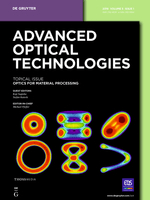
Advanced Optical Technologies
Scope & Guideline
Pioneering Innovations in Light and Materials
Introduction
Aims and Scopes
- Optical Materials and Devices:
Research focusing on the development and characterization of new optical materials, including nonlinear optical materials, photonic crystals, and nanostructured devices. - Laser Technologies and Applications:
Studies on the advancements in laser technologies, including ultrafast lasers, their applications in material processing, biomedical applications, and other fields. - Optical Measurement Techniques:
Innovations in optical measurement methodologies such as ellipsometry, polarimetry, and other spectroscopic techniques for analyzing material properties. - Terahertz and Advanced Photonic Devices:
Research on terahertz technologies and the design of advanced photonic devices, including diffractive optics and waveguide structures. - Smart Imaging and Compression Techniques:
Exploration of intelligent imaging technologies, including lossless compression methods for various applications such as medical imaging.
Trending and Emerging
- Ultrafast Laser Processing:
A significant increase in research focused on ultrafast laser processing techniques indicates a trend towards high-precision material processing and manufacturing applications. - Nanostructured Optical Materials:
Emerging interest in nanostructured materials for optical applications, highlighting their potential in enhancing optical properties and functionalities. - Terahertz Technologies:
Growing focus on terahertz technologies for various applications, including communications and imaging, showcases the expanding scope of this area within optical technologies. - Intelligent Imaging Techniques:
The rise of intelligent imaging technologies, such as visually lossless compression methods, reflects a trend towards enhancing the efficiency and quality of imaging in various fields. - Advanced Optical Measurement Techniques:
An increasing number of studies on sophisticated optical measurement techniques, including spectroscopic ellipsometry and advanced polarization methods, illustrates a trend towards refining measurement accuracy and capabilities.
Declining or Waning
- Smartphone Imaging Technologies:
While smartphone imaging technologies were previously a focus, there has been a noticeable decrease in research publications related to this area, suggesting a shift towards more advanced imaging techniques. - General Optical Measurements:
Research related to traditional optical measurement methods, which may be overshadowed by the rise of novel techniques and technologies, has seen a decline in recent years. - Conventional Laser Applications in Non-Technical Fields:
The exploration of laser applications in non-technical fields, such as basic educational tools or general consumer products, appears to be waning as the journal focuses more on high-impact, technical applications.
Similar Journals
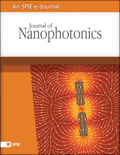
Journal of Nanophotonics
Transforming Ideas into Nanophotonic RealitiesThe Journal of Nanophotonics, published by SPIE-SOC Photo-Optical Instrumentation Engineers, is an esteemed platform dedicated to advancing the field of nanotechnology through pioneering research in photonics. Since its inception in 2007, this journal has become instrumental in disseminating innovative findings and fostering collaborative discussions, especially in the domains of Condensed Matter Physics, Electronic, Optical and Magnetic Materials, and Nanoscience and Nanotechnology. Currently ranked within the Q3 category across these fields, it serves as a vital resource for academics, industry professionals, and students keen on exploring the multifaceted applications and implications of nanophotonic technologies. With its convergence set to continue until 2024, the journal offers a non-open-access model, ensuring rigorous peer-review standards and high-quality publications that contribute to the global body of knowledge.
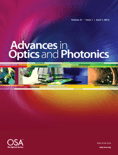
Advances in Optics and Photonics
Shaping Tomorrow's Optical Discoveries TodayAdvances in Optics and Photonics, published by the Optica Publishing Group, stands at the forefront of research dissemination in the fields of Atomic and Molecular Physics and Optics, alongside its prominence in Water Science and Technology. With an impressive Q1 ranking in both categories and a Scopus rank of #2/224, this journal boasts a 99th percentile status, underscoring its significance in the academic community. As a beacon of knowledge since its inception in 2009, the journal is dedicated to featuring cutting-edge research, innovative methodologies, and transformative applications in optics and photonics that can drive advancements across diverse scientific domains. While not an open-access journal, it provides vital insights for researchers, professionals, and students eager to stay updated on emerging trends and breakthroughs. With a convergence period extending to 2024, Advances in Optics and Photonics is positioned as an essential resource for anyone looking to explore the evolving landscape of light-based technologies.

Photonics
Pioneering Discoveries in Atomic and Molecular PhysicsPhotonics, an esteemed journal published by MDPI, is a leading platform for researchers in the fields of atomic and molecular physics, optics, and instrumentation. Since its inception in 2014, the journal has fostered open access to cutting-edge research, facilitating knowledge dissemination in these dynamic disciplines. With its Q2 ranking in the 2023 Scopus metrics for various categories, including radiology, nuclear medicine, and imaging, Photonics represents a crucial academic resource for professionals and students seeking to advance their understanding and expertise. Located in Basel, Switzerland, the journal plays a pivotal role in bridging theoretical and practical approaches to photonic technologies. Researchers are encouraged to contribute their findings, thereby enriching the journal’s impact and relevance in the global scientific community through collaboration and innovation.

JOURNAL OF RUSSIAN LASER RESEARCH
Pioneering Research in Optics and EngineeringThe Journal of Russian Laser Research, published by Springer, stands as a vital resource for researchers and professionals in the fields of atomic and molecular physics, as well as optics and engineering. With its ISSN 1071-2836 and E-ISSN 1573-8760, this journal has been disseminating groundbreaking research since its inception in 1994, with a dedicated focus on the advancement of laser technologies and their applications. While it currently holds a Q4 classification in both Atomic and Molecular Physics and Engineering categories, its commitment to fostering novel insights and innovative methodologies positions it as a promising platform for emerging studies within these disciplines. Although the journal does not offer open access options, it continues to draw attention with a growing citation index. By publishing diverse research articles, reviews, and critical discussions, the Journal of Russian Laser Research not only enriches academic literature but also serves as a stepping stone for students and professionals seeking to deepen their understanding of laser science and its myriad applications.
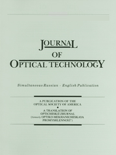
JOURNAL OF OPTICAL TECHNOLOGY
Driving Progress in Optical DisciplinesJOURNAL OF OPTICAL TECHNOLOGY, published by the Optica Publishing Group, serves as a vital resource for researchers and professionals in the fields of optical technology and related disciplines. Established with a commitment to advancing knowledge, this journal spans a broad spectrum of topics, including applied mathematics, atomic and molecular physics, and various engineering disciplines, with a converged publication period from 1995 to 2024. Although it currently holds a Q4 ranking across multiple categories in 2023, it is an important platform for innovative research ideas in a rapidly evolving field. The absence of Open Access may guide readers to explore alternative access options through institutional subscriptions. The journal’s ISSN is 1070-9762 and its E-ISSN is 1091-0786, ensuring accessibility for a global audience. As a publication aimed at fostering scholarly communication, it invites contributions that highlight emerging trends and novel developments in optical technology, catering to a multifaceted audience of researchers, professionals, and students.

ACTA OPTICA SINICA
Fostering Insights in Electronic and Optical MaterialsACTA OPTICA SINICA is a distinguished journal dedicated to the field of optics and photonics, published by the Chinese Laser Press. With an ISSN of 0253-2239, this journal has been an essential resource since its inception, covering significant discoveries and advancements in atomic and molecular physics, electronic materials, and optical sciences. The journal is indexed in Scopus, achieving respectable ranks as Q3 in both Atomic and Molecular Physics, and Optics and Electronic, Optical and Magnetic Materials, reflecting its engagement with current research trends. Although it is not an open-access journal, ACTA OPTICA SINICA is hosted from Shanghai, China, and continues to serve as a vital platform for researchers, professionals, and students alike to disseminate and access high-quality peer-reviewed articles, ensuring its prominent place in the academic discourse related to optics and material sciences.

Optics
Fostering Collaboration Across the Optical CommunityOptics is a pioneering open access journal published by MDPI, dedicated to advancing the field of optics and photonics. Since its inception in 2020, the journal has fostered the dissemination of high-quality research and innovative developments in optical sciences, contributing significantly to its community of researchers, professionals, and students in Switzerland and beyond. With an impact factor reflective of its growing prominence, Optics strives to address a diverse scope, encompassing atomic and molecular physics, electronic materials, and broader topics in physics and astronomy. The journal's commitment to open access ensures that cutting-edge research is freely available, promoting collaboration and knowledge-sharing across disciplines. As of 2023, it holds a Q4 ranking in several categories, including Atomic and Molecular Physics, and Optics, which illustrates its evolving role in the academic landscape, positioning it as a valuable resource for those seeking to explore the frontiers of optical technology and its applications.
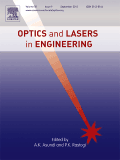
OPTICS AND LASERS IN ENGINEERING
Exploring the Intersection of Light and EngineeringOPTICS AND LASERS IN ENGINEERING, published by Elsevier Science Ltd, is a premier journal dedicated to advancing the field of optics and laser technology in engineering applications. With a robust ISSN of 0143-8166 and E-ISSN 1873-0302, this journal is positioned within the top quartile (Q1) across several categories, including Atomic and Molecular Physics, Electrical Engineering, and Mechanical Engineering as of 2023, showcasing its prestige and impact in the scientific community. The journal has consistently ranked high in Scopus, notably within the top 10% for Mechanical Engineering and Electronic, Optical, and Magnetic Materials research. Since its inception in 1980, OPTICS AND LASERS IN ENGINEERING has served as a vital platform for disseminating cutting-edge research, fostering innovation and collaboration among researchers, professionals, and academia. Though it does not currently offer Open Access options, its high impact factor and selective publication process ensure that articles reach a wide audience while maintaining rigorous academic standards. Researchers and students alike are encouraged to engage with this influential journal to contribute to and stay abreast of advancements in optical technologies and their engineering applications.
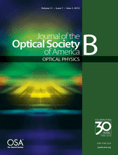
JOURNAL OF THE OPTICAL SOCIETY OF AMERICA B-OPTICAL PHYSICS
Navigating the Landscape of Optical Research ExcellenceJOURNAL OF THE OPTICAL SOCIETY OF AMERICA B-OPTICAL PHYSICS, published by Optica Publishing Group, serves as a leading platform for groundbreaking research in the fields of optical physics, atomic and molecular physics, and statistical and nonlinear physics. With an ISSN of 0740-3224 and an E-ISSN of 1520-8540, this esteemed journal has been in circulation since 1984 and is dedicated to advancing the understanding of optical phenomena and related technologies. It holds a commendable position in the academic community, with a 2023 Scopus ranking reflecting its significance—placing it in the top quartile for both Atomic and Molecular Physics and Statistical and Nonlinear Physics. Although it is not an open-access publication, it provides extensive access options to ensure that research is disseminated effectively within the scientific community. This journal is instrumental for researchers, professionals, and students alike, aiming to keep them informed of the latest advancements and trends in optical science. With a convergence of expertise and innovation, JOSA B continues to play a pivotal role in shaping the future of optical research.

Current Optics and Photonics
Empowering Researchers in Optics and PhotonicsCurrent Optics and Photonics is a premier journal published by the Optical Society Korea, focusing on the dynamic and evolving fields of optics and photonics. With an ISSN of 2508-7266 and E-ISSN 2508-7274, it provides a comprehensive platform for scholarly communication, emphasizing innovations, advances in technology, and theoretical developments in atomic and molecular physics and optics. Situated in South Korea's vibrant academic landscape, this open access journal aims to bridge the gap between theoretical research and practical applications, fostering collaboration and knowledge sharing among researchers, professionals, and students alike. Although currently ranked in the Q3 category for both Atomic and Molecular Physics and Optics, with a Scopus rank of #183/224, it showcases significant contributions that enhance understanding in these critical areas. The journal encourages submission of original research articles, reviews, and technical notes, with the objective of driving forward the conversation in optics and photonics throughout its converged years from 2017 to 2024. Embrace the opportunity to contribute to this expanding field and become part of a community that is at the forefront of scientific discovery.